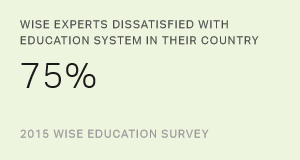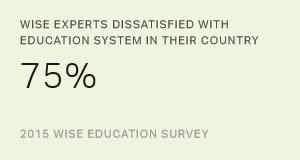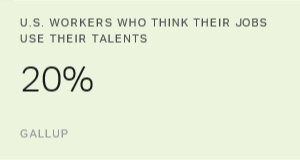Story Highlights
- More collaboration between schools and employers needed
- Experts cite lack of work or internships for students
- Fixing problem is neither overly costly nor difficult
The bad news: There's global consensus that the world's education systems desperately need improvement.
The good news: There's also consensus on how to fix those systems.
At the World Innovation Summit for Education (WISE) in Doha, Qatar, last month, Gallup and WISE released the findings of a survey of 1,550 education experts from 149 countries. These experts express considerable dissatisfaction with the job primary, secondary and postsecondary schools around the world are doing in educating students and preparing them for work.
But the experts are also clear on what should be done about it. Their prescription is more collaboration between schools at all levels and employers of all sorts, such as co-op programs, internships and mentoring, that allows students to put what they are learning in the classroom or online to practical use.
Three-quarters of the WISE experts surveyed are dissatisfied with the education system in their own countries. Further, only 12% consider their education system to be innovative, including a mere 1% who rate it "extremely innovative."

Just 39% of these experts believe universities in their own countries are adequately preparing students for the workplace. And these experts' perspectives on the key obstacles point to clear solutions. Six in 10 cite a lack of work or internship opportunities that prepare students for a job (62%) as the biggest challenge for postsecondary institutions, while about half cite a lack of project-based learning or application of learning to real-world problems (52%). In contrast, fewer than two in 10 cite a lack of access to technology (18%) or a lack of funding (14%) as major challenges.
U.S. Perspective
In the U.S., research from the Gallup-Purdue Index (a large-scale study of more than 60,000 college graduates) reinforces the challenge as well as the opportunity in education today. Just 29% of U.S. college graduates strongly agree that they had an internship or job where they applied what they were learning in the classroom, and 32% strongly agree that they worked on a long-term project that took more than a semester to complete during their undergraduate experience.
Given this poor report on critical work-preparation experiences, it's no surprise that only 14% of adults and 11% of C-level business executives in the U.S. strongly agree that college graduates are well-prepared for workplace success. Yet, when students do have the chance to apply what they are learning in the classroom, the odds they are engaged at work after graduation more than double.
Improving on these measures is neither overly costly nor particularly difficult. It will soon be considered shameful if colleges and universities -- in collaboration with employers -- don't step up in significant ways to create more meaningful work and learning experiences together.
In Brazil, federal policy provides standard rules and regulations for internships, and many college majors require students to complete an internship for graduation. Universities in the U.S. -- even large ones such as Northeastern University -- have created co-op experiences for all students. Awarding academic credits for internship programs is a perfect example of how colleges and universities can move quickly to create more incentive for this kind of experience.
Mayors, governors, education secretaries and presidents alike can stimulate new incentives, requirements or accountability models to increase education-to-employer collaboration of all sorts. There is global consensus on what needs to be done. The only remaining question is: Why aren't we moving rapidly to address the broken link between education and successful employment outcomes?


